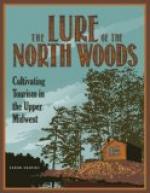Driscoll glanced round for a moment. His hat had fallen off and the miner’s lamp flared and smoked in the water at his feet. His hair was wet with the drops from the roof, and a thin streak of blood ran down his face from a cut a falling stone had made. But his heavy eyes had a fixed, obstinate look.
“You hired me to mind the timbers; it’s my job.”
Scott acquiesced with a gesture and he and Thirlwell watched. There was a risk that in wedging the extra prop the man might loosen the first; and then, if neither was able to bear the load, the rock above would fall and bury him. For all that, Driscoll looked undisturbed and did not stop until he had carefully driven the timber into its proper place. Then he turned to Scott and his glance was slow and dull.
“I want you to send two of the boys along.”
“Why do you want them?”
“I’ve got to have some help. She won’t hold up long unless we run another beam across.”
“It would be prudent,” Thirlwell agreed, and went down the gallery with Scott to the working face.
“What do you think of Black Steve?” Scott asked when they had sent the men and stood near a lamp. “He wasn’t scared just now!”
“I’m puzzled,” said Thirlwell thoughtfully. “The fellow was quite cool. If he hadn’t come with the prop, I expect the roof would have buried us. But that’s another thing. Why did he come?”
Scott smiled. “We were plainly in some danger, but I don’t imagine Black Steve was moved by a generous impulse to save our lives. In fact, if it had promised him some advantage, I rather think he’d have seen us buried.”
“You don’t claim it was a sense of duty?”
“Not in a way; Steve’s too primitive. On the whole, I think he explained the thing best when he said it was his job. A fellow of his kind doesn’t reason like you; perhaps he did once, but lost the habit in the bush. He’s, so to speak, atavistic; moved by instincts, like the Indians and animals.”
“But I don’t see—”
“Perhaps it isn’t very obvious,” Scott admitted. “For all that, the Indian’s instinctive obstinacy carries him far. Steve had undertaken to look after our timbering, he’s used to danger, and the risk didn’t count. I expect he was moved by the feeling the bushman gets when he’s up against Nature; he knows he’ll be crushed if he can’t make good. Anyhow, I’ve moralized long enough. Will you see what they’re doing with that rock-borer?”
Thirlwell left him and went to the machine, which made a jarring noise. He spent some time adjusting the cutters, and afterwards stood for a few minutes thinking about what his comrade had said. Scott’s argument was involved, but Thirlwell thought he saw what he meant. Driscoll’s bemused mind could not grasp the thought of duty that demanded self-sacrifice, but he had animal courage and stubbornness. He would carry out what he had undertaken. Moreover, he might have animal cunning without having cultivated intelligence, and his strength and resolution made him dangerous. Thirlwell did not like Driscoll better than before, but it looked as if the fellow had saved his life, and although he might not have meant to do so, this counted for something. Going back to the shaft presently, he climbed up and sat down in the sun.




